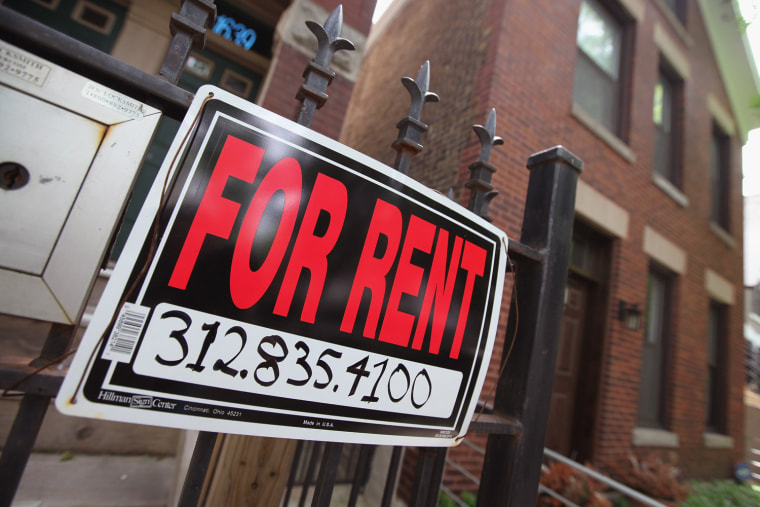Stephan Metelica, a 24-year old charter pilot, shares a two-bedroom apartment with a friend in Chicago’s Lincoln Park neighborhood. The duo split the $1,525 monthly rent, but they were surprised this month when their landlord lease came up for renewal and their landlord asked for a 5 percent increase, to $1,600.
“I was pretty upset about it,” Metelica says of what would amount to nearly $40 more per month per person. “I thought a 5 percent increase was ridiculous.”
Renters, long happy to sidestep the drama homeowners have suffered in the roller-coaster housing market, are now facing their downside of the real estate market’s correction. With apartment and rental housing construction halved in recent years and a wave of former homeowners competing for apartment space with "echo boomers" and other renters, conditions have suddenly ripened for landlords to raise the rent.
Metelica persuaded his landlord to curb the increase, capping his new rent at $1,550. The roommates and landlord have a verbal agreement for that new rental rate, he says, with a new lease signing imminent. But his ability to talk his way out of a bigger rent increase makes him more of an exception than the rule this year, according to experts.
Last year the rental market quietly shifted from a tenants’ market to what is now decidedly a landlord’s market, said Chris Herbert, research director at Harvard’s Joint Center for Housing Studies. The supply of properties is tightening and vacancy rates are dropping, so landlords have been emboldened to raise the rent.
Nationally, rents are expected to rise 5 percent this year and another 5 percent in 2012, according to Greg Willett, vice president of research and analysis at MPF Research in Carrollton, Texas. The trend is not expected to moderate until 2013, when new multifamily housing construction adds to supply and the housing market stabilizes enough to attract new buyers.
“In California, landlords have to file a 60-day notice if they plan to raise rents by more than 10 percent,” Herbert says. “And in some markets, we’re once again seeing them issue those notices.”
Of course all rental markets are local, and the trend is more pronounced in the San Francisco Bay area, for example, than in Southern California where rents are little changed.
In its annual State of the Nation’s Housing report released last week, the Harvard center said rising rents and the rising cost of owning a home are forcing Americans across all income levels to pay a higher proportion of their income for housing. As of 2009, more than 19 million households paid more than half their incomes for housing, including more than 10 million renters, according to the study. Households in the $45,000 to $60,000 income range have faced a particularly sharp increase in the housing cost burden over the past decade.
No one likes seeing the rent rise — but for renters, increases are often a fact of life. And even with the current rent hikes, rental rates in most markets haven’t even returned to prior highs set in 2007 and 2008, according to Willett.
“I think consumers have been taught to think the rent goes up every year, and generally it does,” says Willett. “But it’s the degree of increase that can bother renters. You look at the increase and you make that decision whether or not to move every time the lease comes up. If you’re renting now and you’ve just renewed for 12 months, you’ve probably got one more round of increases before things stabilize.”
Considering that the government-sponsored mortgage buyers Fannie Mae and Freddie Mac are facing potential reforms that could tighten lending standards, and that there’s still a heavy supply of homes for sale, some say renters may not be swayed to move into the ownership market for many years — especially if many new renters tend to be younger.
Most first-time buyers are in their early 30s, according to data from the National Association of Realtors. Metelica, the 24-year old renter, says he’ll probably be at least 29 before he thinks about buying. That means he, and others in his age range, may suffer through a few rent increases before they move to ownership.
To hear landlords discuss the marketplace, the good times have returned.
National apartment operators have adjusted their 2011 forecasts in recent weeks, citing a strong market that is allowing above-average rent increases. Avalonbay Communities, which owns 187 apartment buildings in ten states and Washington, D.C., said this month that rental revenue is expected to increase from 5 to 5.75 percent this year, up from a prior estimate of 4 to 5.5 percent.
"At this point we don't anticipate a recovery in for-sale housing until at least 2013," Michael Schall, president and chief executive officer of Essex Property Trust, stated in an earnings conference call last month. "We are now confident that the apartment supply and demand equation is tipping toward housing shortage and thus both rents and occupancies are improving."
Essex, which owns properties mainly in coastal cities, stated that Northern California and Seattle markets are ahead of Southern California markets, seeing high occupancy (meaning: low vacancy) and a recovery ahead of other areas in the company portfolio.
Chicago-based Equity Residential, which owns about 440 apartment building in major markets such as New York, Boston and Phoenix, reported that it’s expecting net operating income (which includes rental revenue) to rise from 5 to 7.5 percent this year.
Tammy Kotula, spokeswoman for Apartments.com, an online guide to apartments, urges renters to negotiate with landlords, or if they know they’re staying awhile, get a multiyear lease that allows tenants to lock in a low rent.
“You can definitely talk to your landlord and ask to negotiate,” she says. “A two-year lease is a pretty popular option.”
Just don’t expect keeping your rent down to be the cake walk it once was.
“I had to put up a fight about it,” Metelica says.
